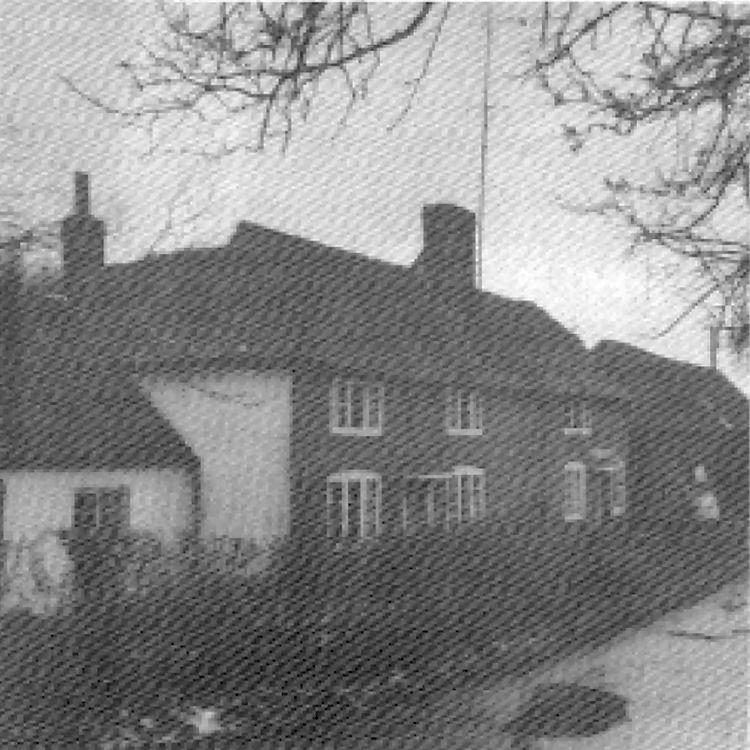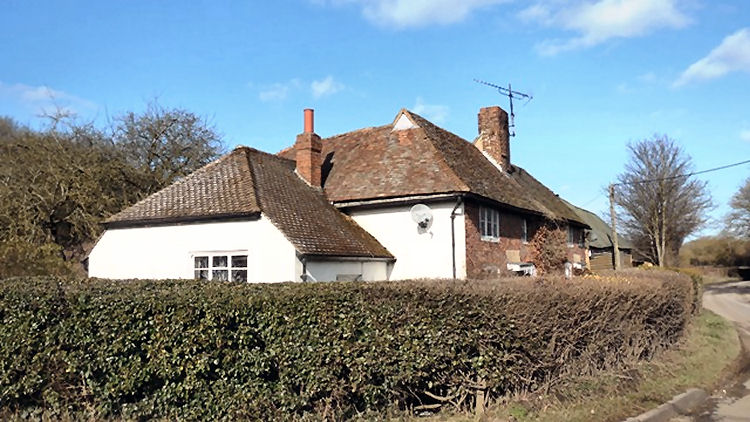|
From
http://www.hartley-kent.org.uk accessed 20 February 2019. By Peter J
Mayer 21 February 2015.
Hartley Bottom Farm / "King's Head."
Hartley Bottom Farm, the home of the Glover family since 1913, is now
Hartley's only farm of any size, but it was once one of the smallest in
the village at 6 acres. Nor has it always been a farm. For over a
century it was the "Kings Arms" Public House, and Mr Glover has in his
possession a fragment of a beer mug inscribed "William Marshall, King's
Arms Hartley".
According to English Heritage, who gave it Grade II listed status, the
house is a 17th century or earlier timber framed building refaced in the
1700s. It may possibly have been the cottage and 6 acres which Richard
Wilson owned with Goldsmiths in 1576, but the first definite reference
comes from the will of Richard Miller of Ash (1625-71). In the will he
states that he had inherited the farm from his brother Thomas, and it
was probably the estate in Hartley left to Thomas and his brothers by
their uncle Robert Averill of Ash in 1656 (the Averills had owned land
in the village since at least the late 1500s). Richard was childless, so
he left Hartley Bottom Farm to his cousin William Fenn of Ash.
Richard Miller also created an annual rent-charge of £1 to be paid by the
owners of the farm, for the benefit of the poor of the parish of Ash. In
1837 the Parliamentary Commissioners for Charities reported that it was
distributed annually in bread on the first Sunday after Christmas. His
charity still exists today, though now merged with 7 other charities to
form "The United Charities for the Poor", Ash. The ravages of inflation
have meant that while £1 would have bought 34 four pound loaves in 1671,
it will not buy even one of that size today. In recent years the charity
has made grants to the New Ash Green Pensioners' Luncheon Club.
William Fenn sold the farm to Richard Walter in 1676, his family finally
parting with the property in 1731, when Thomas and Anne Walter sold it
to Christopher Hayward of Eynsford. Mr Hayward died in 1750 and left the
property to his daughter Mary. His will is particularly generous to her,
and no doubt reflects his concern that his only unmarried daughter
should marry well. For as well as the "King's Arms," she received a cash
bequest of £350 - well in excess of what her married sisters received
(her sisters no doubt had already received marriage settlements).
Christopher's will is also the earliest evidence of it being a pub,
because he mentions that his tenant was "John Knowles, victualler"
(however he is already listed as the tenant on the oldest surviving
parish rate book of 1744).
Mary married twice, first a John Hassell in 1751, by whom she had one
son John. After his death she remarried nine years later to George
Charrington of Beddington in Surrey. As a married woman in the days
before the Married Women's Property Act of 1882, she was not permitted
to own the "King's Arms" in her own name. Although by common law the
possession of the house went to her husband, the inheritance of it did
not. So when George died in 1795, the ownership reverted to Mary.
Eventually it was inherited by John Hassell, her son by her first
marriage. He appears to have sold it to William Bensted of Hartley Court
before 1832. Thereafter the ownership follows a familiar pattern, as
part of Hartley Court it was eventually purchased by Smallowners Limited
and rented to Harold Glover (and later purchased by the family),
formerly of New House Farm, Church Road in 1913.
From the rating lists, we can compile a list of tenants from 1744 to
1880. The rateable value, which is based on what rent the property could
obtain was £5 in 1744, this rose to £12 in 1781, £15 in 1802, fell to
£14 in 1812, and rose back to £15 in 1864.
Meanwhile the tenancy of the public house was held by John Knowles until
his death in 1782. He was then succeeded by William Goldsmith, husband
of his daughter Ruth Knowles, who in turn was publican until his death
in 1803. William was also the freehold owner of Goldsmiths Cottage.
Later tenants included Henry Pitman and Jeremiah Letchford. The pub
ceased to be licensed in the 1870s, probably due to its habit of serving
drinks on Sundays during the times of Church services, an offence which
landed John Coller, the then publican, and three of his customers in
Dartford Police Court in 1872. One former farm worker there, born in
about 1880, could remember tales of his grandmother regularly going down
to the "King's Arms" to drag her husband out! Afterwards the tenants for
many years were William Vone, wheelwright, and his wife Jane.
All this time Hartley Bottom Farm was merely the house and a field of
about 6 acres adjoining. Since then of course under the management of
the Glovers, the farm has expanded to take in Goldsmiths, Hartley Manor
Farm and the remnants of the Hartley Court estate. In 1945 the farm had
grown in size to 90 acres, and since then the landholdings have been
further augmented by purchases of Hartley Manor Farm and land at Idleigh.
The farm was highly praised from Mr Lewis the Ministry of Agriculture
inspector in 1941, who said they were doing an excellent job on what he
considered to be not the best land. Then as now, the farm was mixed
arable and pasture, at the time the animals were an essential part of
arable farming too.
I would like to thank Mr R Glover for all the help given in this
article.
|

